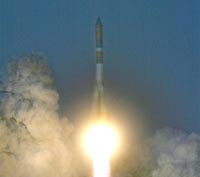China plans to build new space rockets
China will build a new family of rockets, state media said Wednesday, in a move that would boost the country's ability to put satellites and space stations in space.

The announcement follows China's successful launch a week ago of its first lunar probe - a leap forward in the Asian space race. Japan put a probe into orbit around the moon just weeks ago and India is likely to join the rivalry soon, with plans to send its own lunar probe into space in April.
The new Long March 5 rockets, which can be used to carry communication satellites and lunar probes, will be able to carry greater weight than the current batch of rockets.
They signal China's ambitions to have a greater presence in space in the next 30 to 50 years and desire to compete in the global market to launch commercial satellites, the China Daily said.
"It will also give China the same launch capabilities as developed countries," Wu Yansheng, president of China Academy of Launch Vehicle Technology, was quoted as saying by the newspaper.
The Long March 5 rockets - named after the Long March undertaken by retreating Communist forces to a safe haven in northern province of Shaanxi in 1935 - will be made in the northeastern port city of Tianjin.
They will be launched from a new launch center based in the tropical island province of Hainan in southern China.
Because of the weight of the rockets, they will be transported by sea, rather than the conventional route overland, the newspaper said. The new generation of rockets will not be launchable until 2013, it said.
A chief designer of China's recent lunar probe, named the Chang'e 1 after a mythical Chinese goddess who flew to the moon, told the state-run Xinhua News Agency on Wednesday that China's space program needs to build more powerful rockets before it can land on the moon.
Research for the second phase of the lunar program has already begun involving lunar rovers, Xinhua said, with a moon landing expected around 2012 when the new rockets come online.
But Ye Peijian, the chief designer, also said there was no timetable for a manned lunar landing, according to the news agency.
Ye told Xinhua that other challenges included limited human resources and technical expertise for the program and a lack of monitoring equipment around the world.
China's increasing presence is space has worried some. In January, China destroyed a satellite with a land-based anti-satellite missile from its southwestern Xichang spaceport.
The rockets can also be used to launch navigation satellites, which the U.S. military relies on for mapping enemy positions and launching missiles.
Telephones rang unanswered Wednesday at the news department of the State Commission of Science, Technology and Industry for National Defense.
Subscribe to Pravda.Ru Telegram channel, Facebook, RSS!


